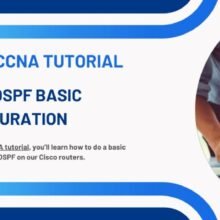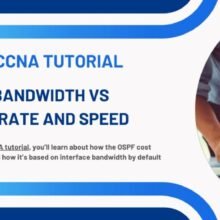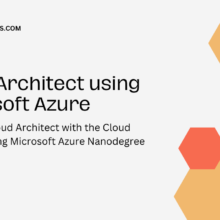Cisco OSPF Basic Configuration In this Cisco CCNA tutorial, you’ll learn how to do a basic configuration of OSPF on our Cisco routers. Scroll down for the video and also text…
Introduction to Quantum Computing

Learn the fundamentals of quantum computing and discover its real-world applications.
Explore the difference between classical and quantum computing with UCL
Quantum computing is a rapidly advancing technology with the potential to transform industry and society.
On this two-week course, you’ll use video, active learning tasks, and group discussion to develop an understanding of the key theories and concepts which underpin quantum computing.

Learn about qubits, superposition, and measurement
Facilitated by world-leading experts from University College London’s Quantum Science and Technology institute, you’ll be guided through the fundamentals of quantum theory without the need for any in-depth mathematical knowledge.
You’ll be introduced to the definitions and properties of qubits, before comparing the characteristics of classical bits and quantum bits.
You’ll also get to take part in live workshops, allowing you to have your questions answered in real-time by experts in the field.
Examine the potential power of quantum computers
Building on your understanding of quantum computing processes, you’ll look to the future and discuss the potential power of quantum computing.
You’ll investigate the limits of classical computing and identify how quantum computing can push physics and quantum theory in new and innovative directions. You’ll also acknowledge the limitations of quantum computing, giving you a rounded overview of this technology’s possible trajectory.
Discover quantum computing algorithms and applications
In the second week of this course, you’ll put your learning into context, discovering real-life applications of It and the problems it can address.
By the end of this course, you’ll have gained an understanding of the theories and concepts that underpin quantum computing. You’ll have contextualised this knowledge, using real-world applications, and be able to discuss it’s advantages and limitations.
What topics will you cover in Quantum Computing course?
- Classical vs quantum computers
- Quantum physics
- Qubits, superposition and measurement
- Quantum algorithms and applications
- Platforms
- The future of quantum computing
Who is this accredited by?

The CPD Certification Service:
This course is accredited by CPD.

When would you like to start learning Quantum Computing?
Start straight away and join a global classroom of learners. If the course hasn’t started yet you’ll see the future date listed below.
- Available now Join – ₹13,329
Learning on this course
On every step of the course you can meet other learners, share your ideas and join in with active discussions in the comments.
What will you achieve?
By the end of the course, you‘ll be able to…
- Explain the key differences in non-mathematical terms between classical and quantum computers
- Identify quantum computing hardware platforms by the technology they are based on
- Outline the most promising applications of quantum computers and their limitations
Who is the course for?
This course is designed for industry professionals working in science, technology, engineering and adjacent fields such as public policy who want to further their knowledge of quantum computing and its applications.
It’s also suitable for those with a general interest in new and emerging technologies.
Title: Introduction to Quantum Computing: Unveiling the Quantum Frontier
It represents a paradigm shift in the world of information processing, offering the potential to solve complex problems that are currently beyond the capabilities of classical computers.
Unlike classical bits, which are binary and can be either 0 or 1, quantum bits or qubits can exist in a superposition of states, allowing them to perform multiple calculations simultaneously.
This phenomenon, coupled with entanglement – a unique property where qubits can become interconnected regardless of distance – enables quantum computers to explore vast solution spaces, promising breakthroughs in fields like cryptography, optimization, and material science.
As researchers and tech giants strive to harness the power of quantum mechanics, understanding the fundamentals of Quantum Computing is a crucial step toward unlocking its revolutionary capabilities.
Title: Quantum Computing 101: Navigating the Fundamentals
In the realm of cutting-edge technology, Quantum Computing stands as a game-changer with the potential to reshape entire industries.
At its core, It leverages the principles of quantum mechanics to process information in ways that challenge classical computing norms.
By harnessing quantum bits or qubits, which can exist in multiple states simultaneously, quantum computers transcend the limits of classical binary systems, making them exceptionally adept at solving complex problems.
The intriguing concept of entanglement further elevates their power, enabling qubits to be interconnected in a manner that defies traditional boundaries.
As we embark on this journey into Quantum Computing, a foundational understanding of its principles and applications is crucial to grasp the transformative potential that lies ahead.

Who will you learn with?

Dan Browne
Dan Browne is a Professor of Physics at University College London. His research specialism is the theory of quantum computers.

John Morton
John Morton is a Professor of Nanoelectronics & Nanophotonics at University College London. He is Director of the UCL Quantum Science and Technology Institute.
Who developed the course?

UCL (University College London)
UCL was founded in 1826. It was the first English university established after Oxford and Cambridge, and the first to open up university education to those previously excluded from it.
What’s included?
This is a premium course. These courses are designed for professionals from specific industries looking to learn with a smaller group of like-minded individuals.
- Unlimited access to this course
- Includes any articles, videos, peer reviews and quizzes
- Certificate of Achievement to prove your success when you’re eligible
- Download and print your Certificate of Achievement anytime
Join – ₹13,329
Learning on FutureLearn

Your learning, your rules
- Courses are split into weeks, activities, and steps to help you keep track of your learning
- Learn through a mix of bite-sized videos, long- and short-form articles, audio, and practical activities
- Stay motivated by using the Progress page to keep track of your step completion and assessment scores
Join a global classroom
- Experience the power of social learning, and get inspired by an international network of learners
- Share ideas with your peers and course educators on every step of the course
- Join the conversation by reading, @ing, liking, bookmarking, and replying to comments from others
Map your progress
- As you work through the course, use notifications and the Progress page to guide your learning
- Whenever you’re ready, mark each step as complete, you’re in control
- Complete 90% of course steps and all of the assessments to earn your certificate
Want to know more about learning on FutureLearn? Using FutureLearn
Get a taste of this course
Find out what this course is like by previewing some of the course steps before you join:
The travelling salesman problem

5 key quantum computing insights








